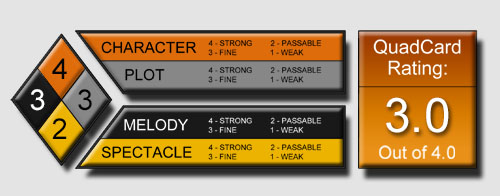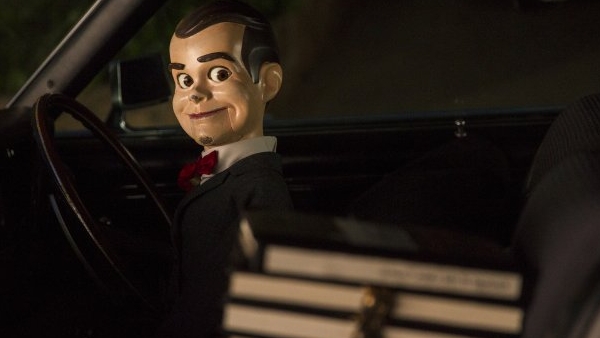 Richard Shepard’s brilliant character study Dom Hemingway is a down and dirty black comedy that’s equal parts bitter and delicious. Also, wasting no time giving credit where it’s due, this is his best film to date. But Shepard, a filmmaker not content to deliver just one kind of story, attempts to test out more than a few genres while chronicling this multifaceted former gangster. It’s crass and unapologetic and Dom himself is a walking calamity but he’s not completely without soul and that’s where Shepard attempts to establish a heartwarming through-line. That might make for a cumbersome story and, at times, Dom Hemingway has trouble finding its stride. Yet, as this all comes from the guy who wrote and directed The Matador, it’s easy to see that Richard Shepard doesn’t mind making things complicated or trying to cram too much into a narrative.
Richard Shepard’s brilliant character study Dom Hemingway is a down and dirty black comedy that’s equal parts bitter and delicious. Also, wasting no time giving credit where it’s due, this is his best film to date. But Shepard, a filmmaker not content to deliver just one kind of story, attempts to test out more than a few genres while chronicling this multifaceted former gangster. It’s crass and unapologetic and Dom himself is a walking calamity but he’s not completely without soul and that’s where Shepard attempts to establish a heartwarming through-line. That might make for a cumbersome story and, at times, Dom Hemingway has trouble finding its stride. Yet, as this all comes from the guy who wrote and directed The Matador, it’s easy to see that Richard Shepard doesn’t mind making things complicated or trying to cram too much into a narrative.
More to that point, the titular Dom in this, Shepard’s 7th film, is an entirely complicated character. From the very first frame  Shepard shows us why he’s a master at crafting one-of-a-kind characters. After delivering one of the most awkward and obscure intro monologues in recent years, one that uncomfortably and hilariously breaks the fourth wall no less, Dom Hemingway (played brilliantly by Jude Law) is released from prison and unleashes the whirlwind of emotion and anger he’s kept locked away. A dozen years is a long time to harbor a grudge and plan the first stop on his freedom tour once out of the big house.
Shepard shows us why he’s a master at crafting one-of-a-kind characters. After delivering one of the most awkward and obscure intro monologues in recent years, one that uncomfortably and hilariously breaks the fourth wall no less, Dom Hemingway (played brilliantly by Jude Law) is released from prison and unleashes the whirlwind of emotion and anger he’s kept locked away. A dozen years is a long time to harbor a grudge and plan the first stop on his freedom tour once out of the big house.
Dom Hemingway is about as gruff and near unsavory as they come. But this hardened master safe-cracker has a gift for gab even in the most dark and serious situations. Writer/director Richard Shepard shows that his silver pen translates perfectly to Jude Law’s silver tongue…even if it’s hidden behind snarling lips and nicotine laced teeth. Dom is an exceptionally fun character to watch because he’s as unpredictable as he is unintentionally hilarious. Further it’s the rants and brilliant monologues that flow like snarky streams of consciousness and help make Hemingway such a compelling character.
There’s really not an definitive label you can pin on Dom; he’s not a hero, that’s for sure, nor is he a reluctant one either. Even after a dozen years in prison he’s not even a villain. In a way he embodies any of the seedy characters you’d expect to find in the British gangster underworld (rivaling that of any number of Guy Ritchie’s inspired hooligans) but really this isn’t a crime film either.
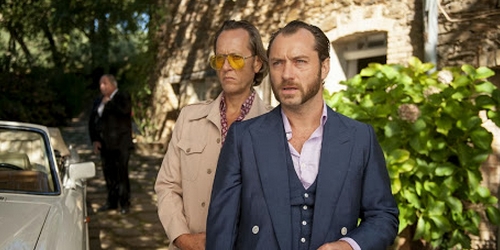
So then who and what is Dom? He’s a man with a particular set of skills only now, fresh out of jail, he’s got no use for them and that makes him a bit of a dinosaur readjusting to the outside world. So the story of Dom Hemingway, among other things, is one of retirement. But the road to old age starts with redemption, specifically to those whom he abandoned by going to prison. But in addition to wanting payback for his time served, and also for not ratting out his boss, he’s equally interested to become reacquainted with his estranged daughter – the young girl (played by Emilia Clarke) who was raised by his wife and her new husband. That’s where the heartwarming through-line starts to come in.
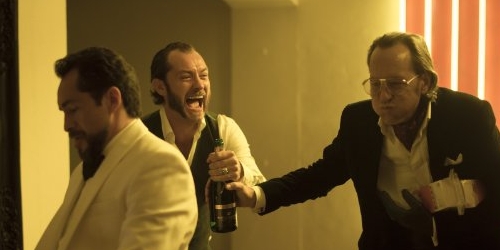
The film takes place in the span of about a week and while Dom’s character goes through changes so too does the film. It takes tonal swings and in an attempt to seam these somewhat disjointed plot branches (that make it feel like different movies) Shepard punctuates the story with what can best be described at chapter breaks. These are made all the more prominent and justified by the old text-on-screen manner of exposition. Don Hemingway is set on getting his “present” from his old boss (for his time served), yet when things go awry and his reward is stolen, he has even less hope and options then when he was in prison.
So the only option left is to seek out his daughter (on his lit of “to-dos” she was second) however he is not in the best shape to try to rekindle those long dormant paternal embers. On the other side of the coin his daughter Evelyn (Emilia Clark) is none the less happy to see her dad show up and in such a state of disrepair. Now guys like Dom don’t change and so begins an ill-fated attempt to get back into the safe cracking game but also trying to make his daughter see him for more than the grossly absent father he’s been.
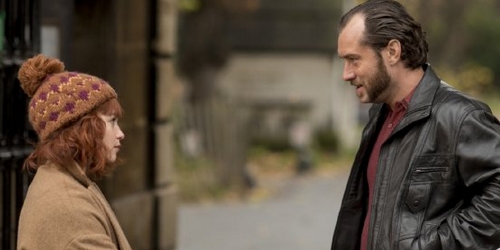
However, as fun as he is, it’s not really clear if the world needs more than one sitting with this colorfully dirty British criminal with a, as trite as it sounds, heart of gold, but Dom Hemingway makes for one hell of an adventure on screen. Even with all his mishaps and setbacks, it’s the attitude and aura that makes this such a trip. It’s got echoes of The Matador and provided there ever was a niche genre that finds a home between Edgar Wright and Jim Jarmusch’s films Richard Shepard’s Dom Hemingway fits the bill entirely. You all might do things the exact opposite of Dom going about your day and better handle situations he throws himself into by not getting into those situations in the first place. Dom is hard-headed and doesn’t stop to look both ways before crossing the road – you’d think he’d use better judgement but then again he’s Dom Hemingway, and you’re not.
G-S-T RULING:
It’s been too long since the world was blessed with Richard Shepard’s characters. Barring the narrative ups and downs, it’s really just a vehicle for this incredibly fun, albeit shocking, and kind of pathetic, but unexpectedly engaging character to shine. As brilliant as the character is on paper, Dom Hemingway would cease to exist without Jude Law’s delivery and theatricality. Richard Shepard’s writing (as sharp as it is hilarious) gives Jude Law pages and pages of glorious rants to deliver. And with a cast like Demian Bechir and Richard E. Grant to play off, Dom Hemingway is the role of a lifetime.
